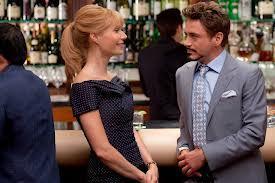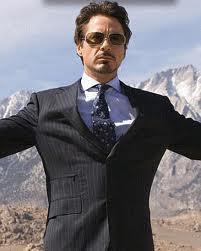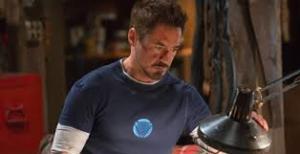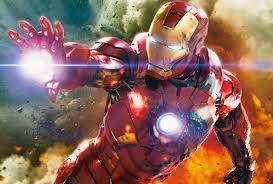When Robert Downey Jr. was tapped to play Tony Stark in Marvel Studio’s adaptation of Iron Man, more than a few eyebrows were raised in that skeptical, condescending fashion that only people with really talented eyebrows can pull off. The film may have been a box-office smash, but casting him was a major risk. Following decades-spanning bouts with drug addiction, arrests, jail time, and on-set difficulties, he was hardly considered a sure-fire audience bringer and was an unlikely choice for a big-budget comic book adaptation featuring a second-tiered Marvel superhero.

“I don’t become a superhero with chemicals or anything, right? No? Great, I’m sold.”
It’s not that Robert Downey Jr. was considered untalented. Quite the contrary. He’s often been listed as one of the best actors of his generation, he had been nominated for an Oscar for his titular role in Richard Attenborough’s deeply flawed biopic, Chaplin, and his onscreen characters have almost always been interesting, at the very least. The fact that his talent was, and remains so to this day, so extraordinary was the primary reason he was able to continue working, even when all logic would have dictated his career was over. His private difficulties certainly cost him roles, as insurance to cover the troubled star was often too steep a price for a studio to agree to front, but people were always willing and wanting to cast him and provide him a second, third, and eightieth chance. His talent weighed against the potential problems that accompanied him seemed an acceptable risk. David E. Kelly used him to breath new life into the fading cultural milestone television series that was Ally McBeal, before his difficulties with addiction forced his character to be abruptly written off the show, and Kelly was far from alone in his willingness to work with him. Almost any filmmaker was willing to cope with his vice-ridden persona in order to have him on a film set. Hollywood is a notoriously forgiving place. After all, Roman Polanski won an Oscar in 2003, even though still-standing rape charges involving a 12-year old girl kept him from accepting it. Yet, it seemed particularly willing to accept Downey Jr. back into its loving embrace with no questions asked and only the cursory of promises that he was well and truly sober this time as assurance. If the promise proved false, the Hollywood machine acted as the co-dependent lover– always willing to ignore the signs, disregard the signals and again welcome him into its loving embrace.

“Come on, baby. I swear I’ve changed this time.”
The fact that Robert Downey Jr., now several years sober, is one of box office’s most reliable, financially successful names is a tribute to his talent and seemingly effortless appeal. The fact he emerged from his vices with his quirky, leading-man good looks intact and a lucrative film career established is phenomenal. Role after role has capitalized on his ability to seem good-natured, yet fast-talking and justifiably cocky. Iron Man director Jon Favreau had to fight hard for Downey’s casting, as the studio was understandably wary of casting a notoriously erratic, unestablished (in terms of blockbuster success) actors at the center of what they hoped would be a massive hit. The fact that was Downey was a man in his 40s did little assuage the studio’s worries. Yet, Favreau recognized that Downey could play Stark, a billionaire weapons manufacturer who relishes in excess both before and after his donning of the Iron Man attire, as a “likable asshole.” Marvel’s desire was to compete with Warner Brother’s upcoming Batman sequel, The Dark Knight, and a more established, younger leading man would have been an understandable casting decision.Yet, Batman Begins had found success with the unlikely casting of the intense, difficult, yet freakishly talented actor Christian Bale in the title role, and Marvel seemed to use that knowledge to take a casting risk of their own, and the gamble paid off. Tony Stark exists as a character precariously balanced between lovable rogue and obnoxious jerk, and much of the credit for maintaining that balance can be laid at Robert Downey Jr.’s feet.

Rogue or hero? You decide.
With the release of Iron Man 3 this week (Friday, to be exact), there has been talk of how much longer Robert Downey Jr. will be willing to play Tony Stark. After all, Downey is nearing fifty years of age, and his contract is soon expiring. He is signed on for Joss Whedon’s Avengers sequel, but after that, his future with Marvel Studios is murky. He has insinuated a desire to return to smaller, artier fare and leave the metal suit behind him, and he is aware that his body can withstand action-heavy movies like Iron Man for only so long. In response, the studio, while clearly preferring he stay until he lacks the strength to stand without wheezing and staggering, have stated they will recast should he choose not to extend his contract.
I can understand the studio’s feelings. After all, surely the character is greater than his player, right? Well, perhaps, but I think the Iron Man saga might find itself in dire straights without Downey’s presence. The studio may be seriously underestimating how instrumental he is to the film’s success.
As stated above, Robert Downey Jr. keeps the Tony Stark character likable, even when he is saying cruel, biting insults. This is a character for whom sarcasm is a second language, if not the only language he in fact knows. He’s almost the Hamlet of the Marvel universe– clearly intelligent, sarcastic, contemptuous of those he feels lack his intellectual prowess, and often exists as a man who is driven to action but would prefer not to get his hands dirty.

“To don a metal suit or not to don a metal suit? That is the question.”
There is sadness and anger at the character’s core, but it’s concealed beneath cruel barbs, quick-witted one-liners, and wealthy excesses. The world is too much with Tony Stark, and he conceals the burdens he feels from being of the world with rapid-fire sarcasm and arrogance. It takes an actor of Robert Downey Jr.’s calliber to effectively portray the emotional, burdened side of Tony Stark and couple it with the biting, superficial public persona. A character like Stark only works if the viewing public feels there is an equally intelligent, emotionally compelling actor behind the role, and Downey fills those requirements perfectly.
The first Iron Man had to feature a credible character transformation from Downey. He had to begin the film as a shallow, selfish, but still enjoyable individual and emerge a character who gains some aspect of nobler humanity but never loses his sarcastic edge. Stark becomes a better man, not a different one, and that’s the appeal in casting Downey. He makes that distinction apparent. Tony Stark may grow and mature, but he will never lose his boyish rakishness. In a less capable actor’s hands, the transformation might seem too abrupt and lack credibility. You have to believe both Stark’s fast-talking sarcasm and the impassioned plea he makes to his devoted aide, Pepper Potts that he has no choice but to be Iron Man, that only he can take the actions that need to be taken. Downey makes that duality believable.

Without someone interesting here…

This would be meaningless.
Now, am I suggesting that marvel retire the character when Robert Downey Jr. steps away from the role? No, I’m not. That would be ridiculous, and no studio would do such a thing. I am, however, suggesting they need to seriously consider how they handle Downey’s departure (if that departure is as forthcoming as has been implied). Who ever steps into the role has very large shoes to fill, because whether the studio will admit to it or not, Tony Stark is not the draw. He is only as compelling as the actor playing him. Robert Downey Jr. is the character’s primary source of mainstream public appeal. He’s who the audience pays to see, and finding someone to match that appeal will be a challenge.
I leave you with the trailer for Iron Man 3. See it in theatres this Friday!
So, what do you think, guys? Do you think Robert Downey Jr. is as essential to Iron Man’s success as I do? Do you think recasting is far easier than I implied? Let us know in the comments!

